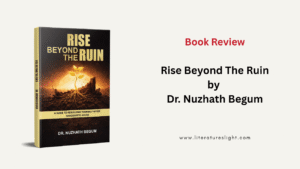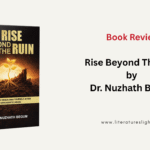And You No More Wake to Walls by Prashant Rawal — A Lyrical Journey Through Grief and Memory
Grief has many languages. In Prashant Rawal’s debut literary novel, And You No More Wake to Walls, it speaks in silences, in footsteps on forgotten roads, and in the quiet spaces between memory and regret. This is not a tale of loud breakdowns or grand reconciliations—it is the story of a father’s inward pilgrimage after the loss of his only child, told in prose that lingers like breath on a cold window.
The Premise — A Father, a Loss, and a Pilgrimage Across Memory
The novel opens with Rajan, a retired schoolteacher, reeling from the death of his daughter, Meera. Instead of seeking comfort in family or routine, Rajan retreats—from words, from people, from the familiar rhythms of life.
He abandons his home and begins walking across India. His path is unplanned, yet deliberate in its emotional compass—he visits every place Meera once inhabited. School corridors, hospital rooms, temple courtyards… each space is a repository of her unseen struggles and his unspoken regrets.
The journey is not about finding closure but about dwelling in the rawness of grief until its edges soften into understanding.
Themes That Linger Beyond the Page
While And You No More Wake to Walls is deeply rooted in the specific relationship between a father and daughter, its themes reach far wider.
Parental Grief
The book is an intimate portrayal of a parent’s mourning—how it dismantles identity, rearranges memory, and strips life down to its most elemental truths.
Mental Health and Unspoken Struggles
Through Rajan’s fragmented encounters, readers sense the undercurrents of Meera’s pain. The novel examines how silence around mental health can shape destinies and deepen isolation.
Intergenerational Silence
Rajan’s love for Meera is real but restrained, shaped by societal expectations, control, and unexamined norms. Rawal probes how such patterns are inherited and how breaking them requires unlearning.
Letting Go of Ego
Rajan’s journey is also a shedding of identities—teacher, father, protector—and an acceptance of his limitations. In the absence of roles, he learns presence.
The Writing — Quiet, Poetic, and Immersive
Prashant Rawal’s prose is lyrical without being ornamental. The chapters read like meditations—short, precise, yet emotionally resonant. Readers are invited to pause, to sit with the weight of a sentence, to let an image unfurl in their mind.
This is fiction that does not rush. It whispers rather than declares. It asks you to listen, to watch, and to feel the spaces between words.
About the Author — Prashant Rawal
Before turning to fiction, Prashant Rawal served as a soldier and later became a life coach. His life’s work revolves around helping others navigate emotional turbulence, reclaim clarity, and rediscover courage. He is the founder of Life Happens Coaching, guiding people through moments when life feels unmoored.
On his website, www.gumshum.com, he curates essays on grief, growth, and inner leadership—reflecting the same tenderness and insight that infuse his novel.
And You No More Wake to Walls marks his debut into literary fiction, offering a delicate balance between emotional honesty and narrative restraint.
Why This Novel Matters
In a world where stories often seek redemption arcs or happy endings, Rawal’s novel stands apart. It doesn’t promise healing in a neat package. Instead, it offers something quieter but perhaps more enduring—the possibility of living with loss without letting it hollow you out completely.
For readers who value introspective storytelling, And You No More Wake to Walls offers:
- An exploration of grief without melodrama — grounded in authenticity.
- A portrait of India’s landscapes — not just as physical spaces but as emotional terrains.
- A meditation on love and its limitations — tender yet unsparing.
- A narrative style that rewards slow reading — each page a moment of pause.
Who Should Read And You No More Wake to Walls
This is a novel for:
- Readers of literary fiction who appreciate poetic prose.
- Those drawn to stories of grief, parental love, and emotional inheritance.
- Anyone who has navigated loss and seeks resonance in art.
- Lovers of introspective, meditative narratives rather than fast-paced plots.
If you’ve read and admired works by authors like Jhumpa Lahiri, Arundhati Roy, or Kazuo Ishiguro, Rawal’s voice will feel like a kindred spirit.
Final Thoughts — A Novel That Stays With You
And You No More Wake to Walls is not just a book—it is an experience that asks you to slow down, to inhabit moments fully, and to confront the silences within your own life. It does not aim to fix grief but to honor it, making space for the kind of understanding that emerges only when all the noise fades.
Prashant Rawal’s debut is a reminder that the most profound journeys are often taken not to find something new, but to return—changed—to what has always been.






